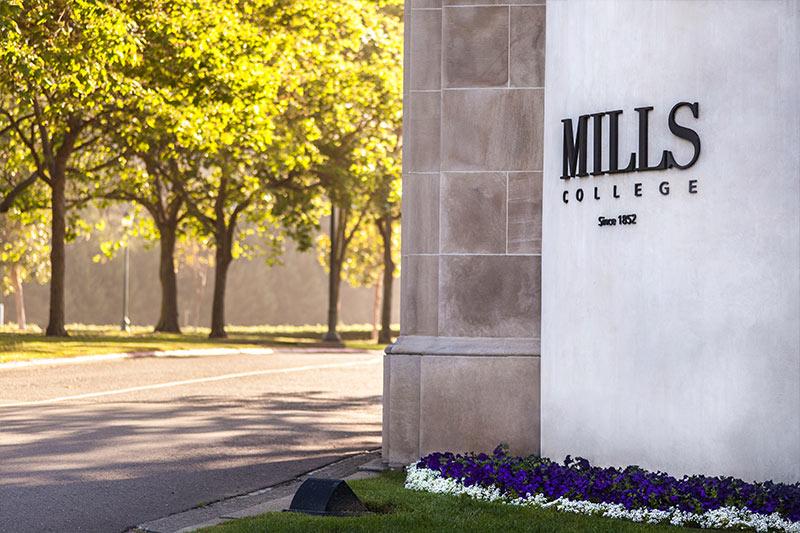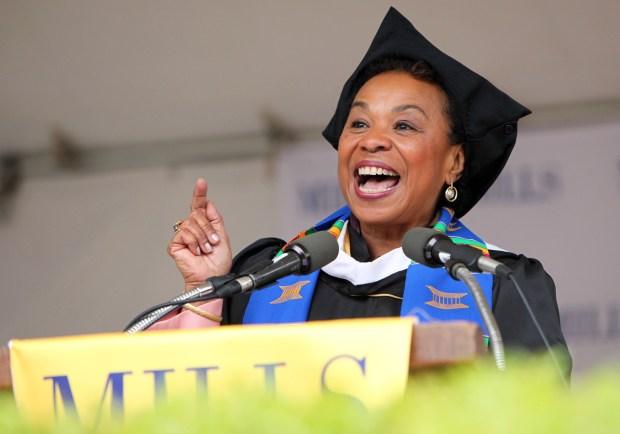
The bombshell last week about the apparent demise of 169-year-old Mills College as a degree-granting institution was far from a simple headline. The story is complex and “still developing.”
Mills College President Elizabeth Hillman announced on Wednesday the decision by the school’s Board of Trustees that Mills after this fall will no longer enroll new first-year undergraduate students and “will likely confer its final degrees in 2023,” but said the move is “pending further consideration and action by the board of trustees.” On Friday, in an interview on KQED-FM, Hillman further emphasized that if the school is helped, its future may yet be reconsidered.
The announcement emphasized that since 1852, Mills College has brought transformative learning opportunities to many by breaking barriers, forging connections, and changing lives. Now, Hillman said, because of the economic burdens of the COVID-19 pandemic, structural changes across higher education, and Mills’ declining enrollment and budget deficits, Mills must begin to shift away from being a degree-granting college and toward becoming a Mills Institute that can sustain Mills’ mission.
Instead of the degree-granting program, “We will focus our resources on building degree pathways for our continuing students, and supporting the new first-year undergraduate, transfer, and graduate students who will join us this fall.”
The plan calls for the provost’s office, working under the guidance of Mills’ accrediting agency, the WASC Senior College and University Commission, to develop plans for each degree program that Mills offers, enabling students to either earn a Mills degree or transfer to another college or university.

The Mills admissions office will support students who choose to pursue transfer opportunities outside Mills through agreements with peer institutions. Mills is committed to working with these institutions to provide our students with streamlined admission processes, financial aid support, and pathways to degree completion.
While Mills’ role as a degree-granting college will end, its mission will endure. Mills intends to continue to foster women’s leadership and student success, advance gender and racial equity, and cultivate innovative pedagogy, research, and critical thinking by creating a Mills Institute housed on campus.
The uncertainty of the future even against such crushing realities as enrollment dropping from 1,500 to 900, years of operating deficits, and the impact of the pandemic explains the huge reaction to the announcement. Besides present and former faculty members and prominent alumnae, the response came from far and wide.
For example, The Washington Post’s Pulitzer-winning music writer Tim Page wrote from Belgrade: “Now this is rotten news. Mills was a huge force in American music — my teacher Charles Jones worked there with Darius Milhaud for years, and it is where Steve Reich developed his phasing technique. Pauline Oliveros, Alvin Curran, John Cage, so many more ...”

Closer to home, a 1973 graduate, Congresswoman Barbara Lee, D-Oakland, expressed “outrage” and spoke of being “heartbroken”:
“Mills College has been essential in the recruiting and retention of Black and Latina students, and must be able to continue in that important role. In light of these concerns, I am asking the Board of Trustees to reconsider the decision to close the college, and to explore all available funding options to meet its financial challenges.”
Lee’s history with Mills points to the school’s special place: As a single mother raising two sons, she attended Mills College and received public assistance while building a better life for her family. As president of Mills College’s Black Student Union, she invited Congresswoman Shirley Chisholm, the first African American woman elected to Congress, to speak on campus.
As a result of that meeting, Lee registered to vote for the first time and worked on Congresswoman Chisholm’s historic presidential campaign, including serving as her delegate at the 1972 Democratic National Convention in Miami, and began her own elective history.
Having served three terms in the California State Assembly, one year as a state senator, and 16 years as the congressional representative of California’s 13th district, she has advocated for affordable and accessible healthcare, fairer immigration policies, normalizing relations with Cuba, the reproductive rights of women, and an end to poverty.

In newspaper articles, TV and radio interviews, dozens of alumnae presented similar stories of their own success with Mills’ help against great odds. And, just as Page pointed out, the school’s role in the history of contemporary music and arts is remarkable. Consider just a small sample of Mills faculty over the years:
Robert Ashley, Luciano Berio, Anthony Braxton, Dave Brubeck, John Cage, Alvin Curran, Lou Harrison and Bill Colvig, Joan Jeanrenaud, Darius Milhaud, Pauline Oliveros, Terry Riley, Dean Rusk, Homer Sprague, Zvezdelina Stankova, and Catherine Wagner.
And among alumni: performance artist Laurie Anderson; choreographer Trisha Brown; musician-composer Dave Brubeck; director Sofia Coppola; actress Olivia de Havilland; U.S. Ambassador to Iraq April Catherine Glaspie; contributing author to the Japanese constitution (on staff to Gen. Douglas MacArthur) Beate Sirota Gordon.
Also, CNN correspondent May Lee; Grateful Dead bassist Phil Lesh; musician-composer Amy X. Neuburg; Governor of Washington and chair of the U.S. Atomic Energy Commission Dixy Lee Ray; pianist Gordon Watson; composer-musician Hsiung-Zee Wong; author and artist Jade Snow Wong; historian Connie Young Yu.
As reported in the SF Chronicle soon after the announcement, many of Mills’ 25,000 alumnae have started organizing to save the school. Lateefah Simon, a BART board director and president of the racial-justice Akonadi Foundation in Oakland, was just one of the prominent voices protesting the school’s closure.
I, along with hundreds of alumni, will work to save Mills,’ said Simon, who spent 12 years working part time for her degree, earned in 2018.
I went to Mills as a single mother, and my daughter often sat at my side on the floor while I was in lectures. There’s not another place like Mills in the world.”

